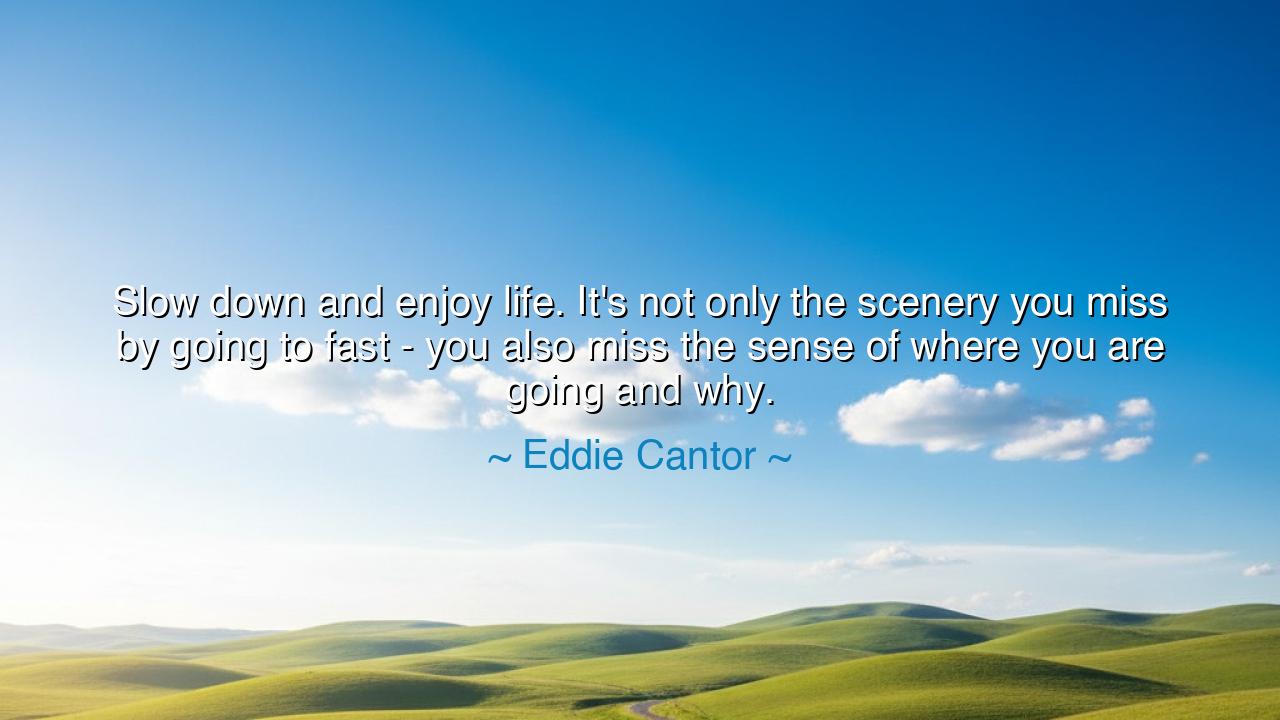
Slow down and enjoy life. It's not only the scenery you miss by
Slow down and enjoy life. It's not only the scenery you miss by going to fast - you also miss the sense of where you are going and why.






"Slow down and enjoy life. It's not only the scenery you miss by going too fast - you also miss the sense of where you are going and why." These wise words from Eddie Cantor strike at the very heart of what it means to live a life filled with meaning and purpose. Cantor’s message is a reminder that, in our modern world, driven by the relentless pace of work, technology, and societal expectations, we often overlook the beauty and wisdom of life’s journey. By rushing toward the next goal or destination, we miss the opportunity to truly experience the present moment, and in doing so, we lose sight of the deeper meaning and direction of our lives. This quote invites us to pause, reflect, and slow down so that we can find clarity and purpose in each step we take.
The origin of this perspective can be traced to the ancient teachings of mindfulness and self-awareness, concepts found in both Eastern and Western philosophies. Socrates, the Greek philosopher, famously said, “The unexamined life is not worth living.” In this, Socrates emphasized the importance of slowing down to reflect on one’s actions, motivations, and path in life. He understood that the pursuit of truth and wisdom requires not just a desire to move forward, but a willingness to stop, think, and reassess. Similarly, the Buddha taught that true enlightenment comes through mindfulness — the practice of being fully present in the moment and aware of the impermanence of all things. Just as the Buddha sought to slow the mind to recognize the fleeting nature of life, Cantor’s words encourage us to slow down to recognize the richness of life that surrounds us.
Consider the life of Leonardo da Vinci, whose genius is not merely measured by his many inventions and artworks, but also by his deep curiosity and willingness to slow down and observe the world around him. Da Vinci famously kept notebooks filled with observations of the natural world, ranging from the movement of water to the anatomy of the human body. These moments of reflection and slowness were integral to his brilliance. In his practice of slowing down, he found the details that many would overlook. Da Vinci’s life illustrates how, in slowing down to observe, we find the answers to the deeper questions of existence. If he had been caught in the rush to achieve, he might have missed the fundamental lessons that would fuel his genius.
The ancient Chinese philosopher Laozi, in his Tao Te Ching, taught that the way of wisdom is through simplicity and stillness. Laozi famously wrote, “A journey of a thousand miles begins with a single step.” In this, he underscores the importance of each moment, each decision, and each breath along the journey. Rushing, Laozi suggested, only leads to exhaustion and confusion. The wise person, he believed, moves with purpose and clarity, knowing that the path itself is as significant as the destination. In line with Cantor’s message, Laozi’s wisdom reminds us that by slowing down and becoming aware of where we are, we can better understand where we are going and why.
In the modern era, the story of Mahatma Gandhi serves as another powerful example of how slowing down and reflecting on one’s path can change the course of history. Gandhi’s nonviolent resistance to British colonial rule was rooted in his deep commitment to purpose and reflection. His movement was not about rushing toward an outcome but about slowing down to examine the moral path forward. In his struggle, he often found time to meditate, to reflect on his principles, and to question the methods of protest. Gandhi understood that the journey toward justice was just as important as the goal, and by staying present in each moment, he brought clarity and meaning to the cause of freedom.
The lesson in Cantor’s quote is one of reflection, mindfulness, and intentionality. We are often caught up in the frantic pace of modern life, where success and achievement are constantly emphasized. But Cantor reminds us that the pursuit of life’s goals cannot be rushed. To truly enjoy life, we must take the time to slow down, reflect, and be aware of our purpose. By doing so, we open ourselves to deeper understanding and greater fulfillment, rather than rushing toward a destination that might leave us feeling empty or lost.
To apply this wisdom in our own lives, we must commit to the practice of mindfulness. This can be as simple as taking time each day to pause and reflect, whether through meditation, journaling, or simply spending a few quiet moments in nature. It means learning to listen to our inner voice and pay attention to the present, rather than constantly rushing ahead. By slowing down, we cultivate a life of purpose, where each step is guided by clarity and intention. Just as Leonardo da Vinci and Mahatma Gandhi took the time to reflect and be mindful, so too must we if we are to live a life that is rich with meaning and full of insight.
In conclusion, Eddie Cantor’s wisdom serves as a timeless reminder that life is not a race, but a journey. The way we live, the pace at which we move, and the intentions we set along the way are what give life its true meaning. By slowing down, reflecting on our path, and appreciating the present, we find the clarity and understanding that guide us toward our true destination. Let us remember that in every step we take, in every moment of stillness, we are not just moving forward, but we are finding the depths of the life we’ve been given.






AAdministratorAdministrator
Welcome, honored guests. Please leave a comment, we will respond soon